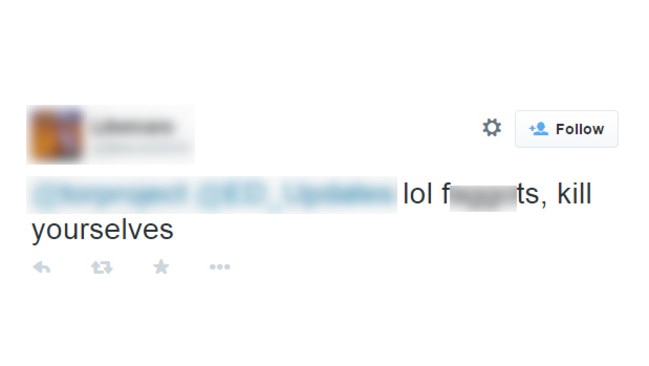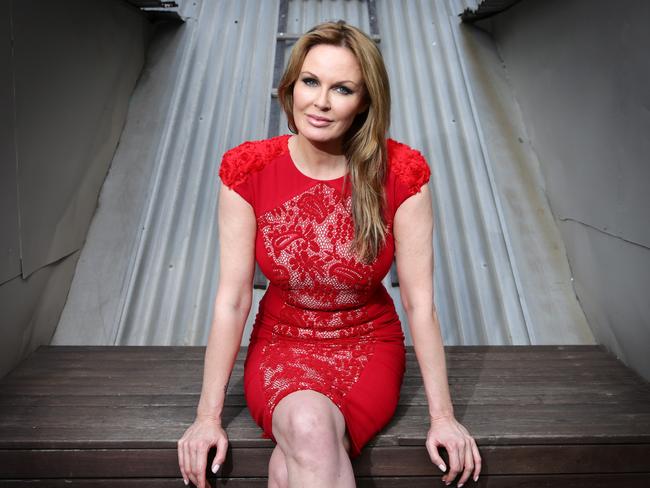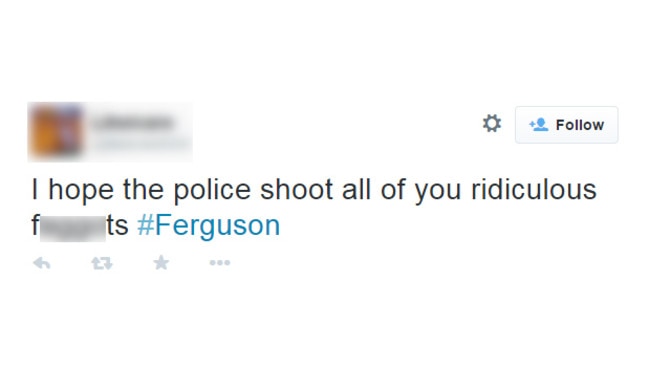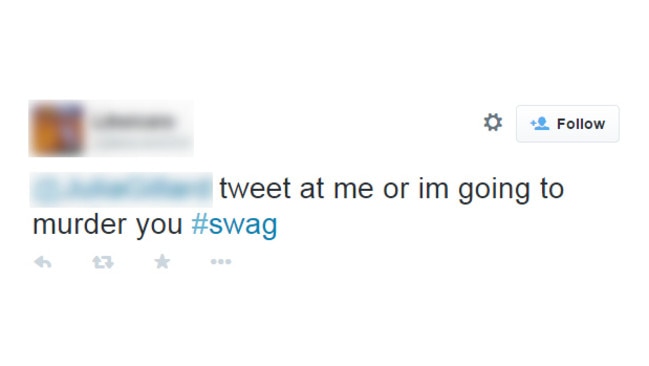Interviews with the trolls: ‘We go after women because they are easier to hurt’
THEY sit behind a pseudonym and go after women because they are weaker. “You could post what school their kids go to and stuff like that. That’s gonna get them really angry,” a troll tells news.com.au.

THE internet can be a frightening place with hidden crevices and dark bridges for trolls to hide under. But who are the anonymous people that provoke and hound others online, sometimes with devastating consequences?
When he was 14-years-old, Mark, who spoke on condition of anonymity, started trolling memorial Facebook pages of public figures who had died.
He says it gave him “a feeling of enjoyment and power over causing their family members distress and pain and anger.”
Among Mark’s counterparts this is known as “RIP trolling.”
“For example if a girl killed herself I would just say something like ‘RIP. Couldn’t handle the guilt of being an immense s**t any longer.’ You don’t need much to set their family members off,” says Mark.
Mark volunteers that the pleasure he derives from trolling isn’t “normal.” Reflecting on it further, he later adds: “I definitely have psychopathic tendencies.”
Other internet trolls found him wreaking havoc on social media and invited him to join their ranks. That was eight years ago.
These days, Mark trolls social media with accomplices from around the globe, spending about 14 hours a week baiting others online. The comments he posts are frequently violent, racist, misogynist and threatening.

Despite being kicked off Facebook more than 260 times and Twitter about 40 times to date, he has no remorse or guilt about his actions.
“When you first start … you feel bad about it sometimes. But once you’ve been doing it for years, you don’t think about it at all,” Mark says.
To press him on this, I pull out a specific example of one of his Tweets. It says: “Rape is always OK.”
“That is not an acceptable thing to say in public life,” I say to Mark.
“Yep, well that was because the discussion that was happening [online] was about defending rape victims and then someone actually said: ‘Rape is never OK’ so then I replied to that with ‘Rape is always OK,’ just to get a reaction,” he responds.
Me: “But why? If you are someone who has suffered sexual assault, that is such a wounding thing to say. It’s horrendous.”
Mark: “Because if you are a victim of sexual assault, you are open to it. You’ve already got a weakness to that kind of stuff.”
Me: “So you are targeting a person at their weakest point?”
Mark: “Yeah, pretty much.”
This meticulous hunt for a stranger’s wounds is astounding. Why can’t he even attempt to put himself in the victim’s shoes?
“Oh yeah sure but if I was to think of that, I’d just think: ‘Well, I haven’t been raped so I don’t care’,” he says.
I’m then forced to ask: “Do you believe what you are saying?”
“Generally not,” he says.
This is the point of the conversation at which gender is unavoidable. Not always, but often it is women that are under attack.
“Well yeah it is because women are generally weaker,” Mark says, “they are more easily offended and easier to anger and stuff like that.”
Me: “You’re not choosing them because of misogyny, you’re choosing them because they are an easy target?”
Mark: “Yeah generally you can say something about their kids which is gonna set them off pretty quickly. Like you could post what school they go to and stuff like that. That’s gonna get them really angry.”
“I don’t actually have any problem with them being a woman. I’m doing it because at that moment it time, I’m going to get a better reaction out of them.”

Craig, 26, is another young, fully employed male who spends hours each week trolling others. In theory a troll could be anyone but both Craig and Mark agree that most of their cohort is just like them — young, white males.
Like Mark, Craig also started this pastime in high school and usually trolls in a group. Unlike Mark, he believes deeply in many of his online comments and doesn’t take part in or agree with gender-based, racist or violent trolling. You could view him as a political troll who enjoys the “adrenalin rush” and the “intellectual exercise.”
Describing himself as “extremely left wing,” Craig frequently sets out to wind up public figures who he believes are centre-left or so-called ‘new atheists.’
“One of the biggest things I draw out of trolling public figures is that they are just as dumb and stupid as the rest of us. There’s nothing special about them,” he says.
It might seem odd that he’s trolling other people on the same side of politics as him, but Craig claims “they are not far enough left.”
“The people who really actually annoy me are what you’d call ‘keyboard activists’ or ‘slacktivists,’ the ones who sit there on Facebook and Twitter and all they do is post internet memes and images and engage in really soft political discourse.
“Their political commitment basically extends to what they can operate from their computer,” he says.
Craig goes on to say the centre left is “easy to troll because they are incredibly earnest their views.”
A fascinating Canadian study, ‘Trolls just want to have fun’, published last year found that internet trolling correlates strongly with the so-called dark tetrad of personality traits: psychopathy, Machiavellianism, narcissism and sadism. But in its everyday form, sadism has the strongest link.
One of the authors of that paper is Professor Del Paulhus from the University of British Columbia. He says the internet has given the sadist, who delights in hurting others, the perfect platform to consummate this dark desire.
“You now have the opportunity to be anonymous and hurt people that can’t hurt you back,” Professor Paulhus says.
Not only this, he says, but “the entire world can see what you’ve said.
“This appetite is the precise core of the sadist and it makes them different from the other dark personalities.
“Signs of suffering is what brings joy to them, as opposed to the psychopath who simply doesn’t care. It’s not that they seek out people to hurt. They just don’t care when people are hurt. To us that’s a key difference,” he says.
In this context, I put to Craig that he might be a sadist himself. Even though Craig works in the non-profit sector and does plenty of volunteer work, he concedes that perhaps he is a sadist.
“But I guess maybe this comes from a sense of self-righteousness here that what I’m doing is good and right. I have no problem with upsetting racists, and homophobes and sexists,” he says.
The conversation moves on but after a few minutes Craig deliberately comes back to sadism, stating that he does “enjoy inflicting that sort of suffering on someone who I think is a bad person.”

Professor Marilyn Campbell from the Queensland University of Technology is one of Australia’s foremost experts in cyber bullying and is in the unenviable position of having been bullied herself because of her work.
She says the potential to experience psychological trauma because of online abuse is extremely real.
“This is not something to be taken lightly. There’s strong evidence to show that if you are the subject of online bullying or trolling, it can cause you significant ongoing distress including anxiety and depression and suicidal thoughts.”
When I remark to Canadian Professor Paulhus that some trolls show a noticeable lack empathy towards others, he agrees wholeheartedly.
“Yes indeed. We think empathy is the key to all of the dark tetrad. It’s the single variable that ties together the willingness to hurt other people,” he says.
Mark doesn’t just hurt other people, he goes so far as to blame them for becoming a victim.
“You are not just going to go after a random person. You are going to go after a person you already know has a weakness. So people kind of, in some way, make themselves victims,” he says.
Craig, on the other hand, appears somewhat empathetic to the victim’s position.
“I don’t want to do anything to anyone where it’s going to pose a credible risk to their employment, their reputation or their feeling of personal safety,” he says.
And in this game safety is a key consideration; it’s a mistake to think that trolling is just a few mean-spirited larrikins saying nasty things on the internet.
“Oh it can get really real-life. It can go pretty far,” Mark says to me at one point.
And then later adds: “It’s really easy for it to go from just playing around to destroying people’s lives. That actually happens really quickly.”
To pay back a vendetta, Mark claims to have recently taken part in “swatting” someone based in the U.S. This is an increasingly common practice among trolls where a hoax call is made to law enforcement authorities, usually claiming there is life threatening hostage situation or bomb threat at play. If the prank works, armoured personnel arrive at the location in full force: guns, screaming, sirens.

Under section 474.17 of the Criminal Code Act, it’s illegal to use a carriage service to menace, harass or cause offence to another person in Australia.
However Mark couldn’t care less about the prospect of being arrested for his behaviour.
“They are bringing in new laws all the time so I know I’m going to get in sh*t for it but I’m just gonna keep on doing it,” he says.
To Mark, the notoriety he gets from peers is worth it. He uses the word “respect” a couple of times and explains that trolling gives him more status than he has in real life.
“I guess it means a lot to me,” he says.
As my talk with Professor Paulhus draws to a close, I’m still searching for some kind of reasonable explanation as to why some people can get such joy out of anonymously hurting others.
“I’m afraid to say, it seems to be part of the human condition,” he says in a pessimistic tone. “An unfortunate side effect of the free speech permitted by the internet.”
Ginger Gorman is a multi-award winning print and radio journalist, and a 2006 World Press Institute Fellow. She has been trolled herself as a result of her media work. Follow her on twitter: @freshchilli



